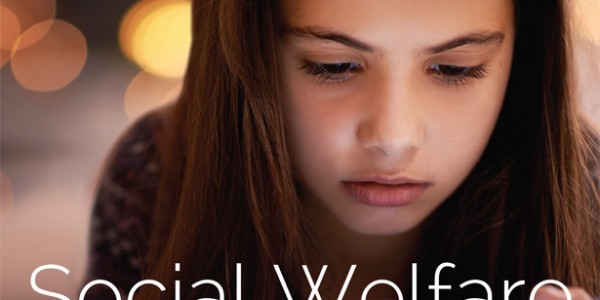Family feature, Like magazine, May 2015. Click to enlarge. Read below.
Social Welfare
As RTE’s Prime Time revealed in December that thousands of photos of Irish teenage girls were finding their way onto hard core pornography sites, it’s becoming increasingly clear that our children are more vulnerable online than anywhere else. Carolyn Moore talks to Colman Noctor about teaching kids the Cop On required to survive and thrive in the digital age.
It’s 5pm. Do you know where your kids are? A quick glance up from these pages might answer that question. Your kids are sitting at the kitchen table, one’s on the laptop, the other’s playing with the tablet. But your kids are online, and so I ask again, it’s 5pm, do you know where your kids are?
There’s almost no decision a parent can make these days that isn’t the subject of heated debate. From attachment parenting to vaccinations; co-sleeping to sleep training, how other people choose to raise their children is frequently a hot topic, and so it is with kids and technology. Screen time. Internet access. Social media – a phenomenon so new that even as adults we’re struggling to get our heads around what it is, what its implications are, and for all the time we spend on it, what it’s actually contributing to our lives.
For many people, social media comes down to connection, and the idea that we’re more connected to each other than ever before because of it. And it’s true that for people living apart from their families and friends, it’s never been easier to maintain that connection to home. They needn’t miss out on a niece or nephew growing up because they can see their photos on Facebook every day, and a comment here or a casual Messenger chat there keeps the lines of communication open, instantly and in real time.
But with the Internet, those open channels of communication run both ways. We can reach out to people with greater ease than ever, but equally people can reach us – and our children – with just as little effort. While it can seem that children are growing up more sheltered and protected than ever, with supervised play-dates and lifts to and from the school gate, child psychotherapist Colman Noctor cautions that “It’s naïve to feel that just because a child is within the four walls of your house they are safe. There are many threats that online access can pose, and often this technology permits intruders virtually into our homes.
“Our physical communities have never been smaller but our virtual communities have never been larger. This means,” he says, “that children are now ‘hanging out’ online. This is mostly a completely unsupervised space and that’s often problematic.”
And not only do we allow them the freedom to explore this online world themselves, often we create the first digital footprints of that journey for them by sharing elements of their lives online. And therein lies the cause for debate. With technology like social media still in its infancy, can we trust our kids with it? Or, more to the point, can we trust it with our kids?
This is one of many questions relating to children and technology that Colman Noctor seeks to address in his new book, Cop On. Describing this quintessentially Irish trait as “the ability to be rational, resilient and sensible, with the grit and good judgment to cope with life’s challenges”, Colman worries that our children may be ill-equipped to deal with the technological advances that are constantly redefining their worlds.
“Young people display a great digital savvy when it comes to technical competence, but an obvious digital naivety when it comes to emotional intelligence,” he explains. And we’ve all seen the three-year-old who swipes on their mother’s phone, enters the passcode, and adeptly navigates their way to the app they want to use, but just because they can doesn’t mean they should.
“The internet is a portal to an outside world that is like any city,” says Colman. “There are wonderful aspects of it in terms of museums and safe play areas, but there are also seedy red light districts that are dangerous.
“We wouldn’t let our children loose in a large city unaided by maps, directions or support, so why do we feel it’s ok to allow them to ramble unsupervised in a virtual city?” he wonders.
But when it comes to guiding them through this digital landscape, where do we even start? “Adults too are only finding their feet when it comes to technology,” he acknowledges, adding that our own forays into the social media arena are still at a very experimental stage.
Profiling, information harvesting, and targeted advertising – these are all practices we know that social media sites engage in, and yet we feel comfortable sharing our lives on sites that profit from our personal information, and offering up our children’s information to be archived in a digital footprint that can never be erased.
“We need to be incredibly mindful of what we post online, about ourselves and others,” says Colman. “All of the information we post, no matter how innocuous, can be used against us for other means.
“The Internet is about gathering information about all of us and this is now becoming more personal. Facebook used to ask ‘where are you?’ but now it asks ‘how are you feeling?’. This progression is about making the interaction more revealing and interesting, but it’s also more intrusive.”
Because the more these sites know about us, the more valuable we become to them, and they seek to overcome any natural reticence on our part by engaging with us on an emotional level. It’s a tactic that even some adults find hard to resist, so it’s no wonder we have increasing concerns about our children’s ability to establish safe boundaries in their social media use.
“Over sharing has become a societal phenomenon,” Colman explains. “It seems that people are more interested now in capturing an experience than experiencing it.
And this is true for adults and children alike. “You can observe it at a music concert where concert goers watch the performance through a 5 inch screen,” says Colman, “and sharing the fact that they’re there seems more important than actually being there.”
Which can also be true of how we engage with our children, with the comedian Louis CK noting wryly that if parents took a moment to stop documenting their children’s lives on their mobile phones, taking in every milestone via that little screen, they’d be amazed by the resolution of their actual child – “It’s totally H.D!” It’s an area where Colman feels we need to be leading by example.
“Cop on is a twofold dynamic, and as parents we need to show a degree of cop on when it comes to these things if we are expecting the same from our children.
“We need to not be answering emails over breakfast or tweeting while we push our child on a swing,” he cautions. “This behaviour does not encourage a sensible relationship with technology for our children.”
“I would advise all families to have ‘sacred spaces’, like meal times, after 10pm and during family movie nights,” he continues. “These become house rules, but must apply to ALL family members.”
So when it comes to that divisive issue of “screen time”, which many parents have come to rely on for an occasional reprieve, and others find unconscionable, the answer seems to be a sensible combination of ”everything in moderation” and “teach by example.”
“Develop a media management culture at home akin to the way you manage treats and ‘junk food’,” Colman advises. “Structure the screen time the way you structure the use of treats.
“Consider screen time the ‘junk food’ of communication – fine in moderation but only as a compliment to face-to-face communication and never as a supplement to it. Once a staple diet of face-to-face communication has occurred, then short periods of screen time can be had.
And once you’ve established these ground rules, it’s vital to watch for signs your child is safely navigating that digital universe.
“Parents need to begin with tight supervision over their children’s digital worlds, with a gradual weaning as they see the child display sensible decision making and cop on.
“Mediate the amount of screen time in relation to the child’s ‘relationship’ with technology,” he continues. “The child who displays pseudo addictive traits when the device is removed or shows a dependency on the technology may need a closer eye on their tech time.”
Ultimately, just as it is true in the real world, your child’s safety in the virtual world will depend on their ability to cope with the issues that come their way and make smart decisions, because as Colman notes, “when your child gets an opportunity to do something online that they shouldn’t, chances are you won’t be there.”
“Cop on is not new, and the strategies to develop it are not new either. Time, structure, relationships and open conversations are crucial to develop and learn how to value important things and not get caught up in the superficial distractions of modern day life.”
And when he puts it like that, you can’t help thinking a healthy dose of cop on is something we could all do with in this day and age.
Cop On is published by Gill & McMillan and is available now from bookshops nationwide and amazon.com

